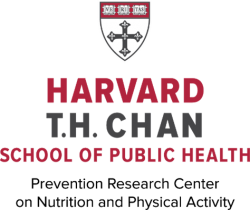Prevention Research Center on Nutrition and Physical Activity at the Harvard T.H. Chan School of Public Health
Populations of Focus: children, families
Topic Areas: family and child nutrition, physical activity, healthy eating, obesity prevention, health equity
Introduction, Mission, and Vision

Improving the nutrition of children's food through programs like the Special Supplemental Nutrition Program for Women, Infants, and Children (WIC) and the National School Lunch Program are proven strategies that can lead to better health and improved equity.
The Prevention Research Center on Nutrition and Physical Activity at the Harvard T.H. Chan School of Public Health (HPRC) is one of 26 Prevention Research Centers (PRCs) supported by the Centers for Disease Control and Prevention (CDC) for the 2019–2024 funding cycle. Each PRC is funded to establish and maintain their center and to conduct a core research project. PRCs may receive supplemental funding to conduct additional research projects and activities.
The mission of HPRC is to work with community partners to develop, evaluate, use, and share cost-effective strategies that will improve population health, nutrition and physical activity, reduce obesity and chronic diseases, and improve health equity.
When communities play a role in identifying, creating, and applying cost-effective strategies to address their problem, it provides “a clear path to achieving these goals,” according to Steven Gortmaker, PhD, principal investigator and director of HPRC.
HPRC also uses community-based participatory research methods to engage with partners in public health practice at local and state levels to support its efforts.
Core Research
Each PRC uses a community-engaged approach to conduct one primary applied public health prevention research project called a core research project. Project activities include design, development, implementation, evaluation, and dissemination. PRCs use at least 50% of their CDC funding to conduct the project in partnership with communities.
Massachusetts-Childhood Obesity Intervention Cost-Effectiveness Study (MA-CHOICES) Project
MA-CHOICES works with community partners, the Massachusetts Department of Public Health, and the Boston Public Health Commission to develop strategies to reduce obesity prevalence and to study how cost-effectiveness metrics are used by partners across the state. This work builds off the broader CHOICES Project, which includes other partners.

Addressing childhood obesity with a range of cost-effective strategies across a variety of settings can ensure that children have opportunities to eat healthy and be physically active.
Identifying what works to prevent childhood obesity has become a priority for public health researchers, policy makers, and the general public. But little attention has been paid to finding solutions that deliver the best results for the dollars invested. HPRC uses the MA-CHOICES Project to help address the obesity epidemic in the United States by identifying the most cost-effective strategies that can prevent obesity and improve health equity.
To support these efforts, the MA-CHOICES research team has created cost-effectiveness estimates for more than 40 of the most widely promoted or used childhood obesity prevention interventions. Many of these interventions have never been fully evaluated for comparative- or cost-effectiveness.
The MA-CHOICES project also uses a learning collaborative implementation strategy to build knowledge and self-efficacy among state and local health agency staff and community partners on cost, effect, population reach, cost-effectiveness, and health disparity concepts and methods. This information is shared through trainings and partner meetings.
The research conducted by the MA-CHOICES Project focuses on cost-effective interventions in schools, during early care and out of school time, and in clinical, treatment, community, and government settings. The research team is working to document how obesity prevention interventions are affecting health equity and to find the most effective ways to communicate this valuable information.
Additional Research
PRCs may receive supplemental funding to work on additional research projects each funding cycle. These Special Interest Projects (SIPs) focus on a variety of health topics or gaps in scientific evidence. PRCS can also conduct additional research as part of SIP Thematic Research Networks, which are groups of PRCs working together on related health topics.
Process, Outcome, and Cost Evaluation of Free Sunscreen Dispensers in Outdoor Community Settings
This SIP is a collaboration between the Harvard PRC and IMPACT Melanoma to test the use and effectiveness of free sunscreen dispensers among teens in Boston, Massachusetts.
PRC Vaccine Confidence Network (PCR VCN)
In April 2021, CDC funded a 12-month award to all 26 PRCs to form the PRC VCN in support of the agency’s Vaccinate with Confidence strategy for COVID-19. As part of this network, HPRC is working with partners to promote vaccine confidence, increase vaccine uptake, and reduce disparities in three Massachusetts communities. The focus is on addressing the needs of immigrant residents and ultimately reducing the incidence of COVID-19 in the United States.
To achieve this goal, HPRC seeks to engage trusted community-based organizations to increase knowledge, improve access, and shift norms and attitudes around the COVID-19 vaccine. The main components of this strategy are to:
- Support community-based health ambassadors to address vaccination concerns and improve access among residents.
- Develop accessible communication materials in multiple languages.
Physical Activity Policy Research and Evaluation Network (PAPREN) Participant
In 2019, HPRC joined PAPREN, which seeks to increase physical activity in communities by working across sectors; focusing on factors that affect the built environment, like land use and transportation policies; and integrating health equity into all policy efforts.
Nutrition and Obesity Policy Research and Evaluation Network (NOPREN) Participant
In 2019, HPRC joined NOPREN, which is a collaborative, equity-focused applied research network that informs policies and practices designed to improve nutrition and prevent obesity.

Location: Boston, Massachusetts
Principal Investigator: Steven Gortmaker, PhD
Deputy Director: Angie Cradock, ScD, MPE
Email: hprc@hsph.harvard.edu